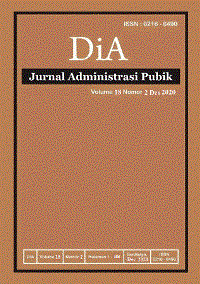EVALUATION OF THE IMPLEMENTATION OF THE ADMINISTRATIVE INFORMATION SYSTEM OF INDONESIAN MIDWIVES ASSOCIATION IN EAST JAVA
DOI:
https://doi.org/10.30996/dia.v18i2.4096Keywords:
Administrative Information System, Indonesian Midwives Association, Smooth, Obstacles, Technical Aspects, Organizational AspectsAbstract
One of the components of the IBI organizational system is an integrated organizational administration system, starting from the central level, provincial level, district / city level, to the lowest level, namely the sub-branch level. Until now, the administrative system has not been well organized, especially in the organizational administration system at the provincial level down to the sub-branch level. One of the obstacles encountered was the inadequate implementation of the Administrative Information System for the Indonesian Midwives Association (SIA-IBI) at the district / city level. It is necessary to evaluate the smooth implementation of SIA-IBI in all districts / cities in East Java Province. The subjects of this descriptive research were all (38) administrators of SIA-IBI. There were 2 variables described in this study, namely: 1) the smooth implementation of SIA-IBI; 2) the obstacles in implementing SIA-IBI. Data on these two variables were collected through direct interviews with all SIA-IBI administrators. The data were analyzed using descriptive statistics, namely frequency and percentage. Based on the data analysis results, it is clear that: 1) all (100%) districts / cities in East Java Province had not been fluent in implementing SIA-IBI; 2) the obstacles faced by SIA-IBI administrators vary widely. The obstacles are grouped into 8 groups, namely: internet connection, double duty, completeness of data, fickle system, limited time, not yet proficient, lack of equipment, and low response to the system. Based on the results, it can be concluded that the implementation of SIA-IBI in all districts / cities in East Java Province has not been going well, and this is related to obstacles from technical and organizational aspects.Downloads
References
Asfiyah, E. Y., & Kurniawati, E. P. (2014). Hubungan antara resiliensi dengan work engagement pada guru di SLB.
Psikoislamika : Jurnal Psikologi dan Islam, 11(2), 17-20. https://doi.org/10.18860/psi.v11i2.6385
Ayu, D. R., Maarif, S., & Sukmawati, A. (2015). Pengaruh job demands, job resources dan personal resources terhadap work engagement. Jurnal Aplikasi Bisnis dan Manajemen, 1(1), 12-22. https://doi.org/10.17358/jabm.1.1.12
Bakker, A. B., & Leiter, M. P. (2010). Work engagement: A handbook of essential theory and research. New York: Psychology Press.
Bakker, A. B., & Bal, P. M. (2010). Weekly work engagement and performance: A study among starting teachers. Journal of Occupational and Organizational Psychology, 83, 189–206. https://doi.org/10.1348/096317909X402596
Dalal, R. S., Baysinger, M., Brummel, B. J., & LeBreton, J. M. (2012). The relative importance of employee engagement, other job attitudes, and trait affect as predictors of job performance. Journal of Applied Social Psychology, 42, 295-325. https://doi.org/10.1111/j.1559-1816.2012.01017.x
Damayanti, A. T., & Handoko. (2018). Pengaruh resiliensi terhadap work engagement pada masinis yang bertugas di Stasiun Tugu Yogyakarta. Jurnal Perkeretaapian Indonesia, 2(2), 87-94.
Fitri, N., Astika, L., & Saptoto, R. (2016). Peran resiliensi dan iklim organisasi terhadap work engagement. Gadjah Mada Journal Of Psychology, 2(1), 38-47.
Handayani, D. A. (2016). Hubungan antara work engagement dengan organizational citizenship behaviour pada karyawan kontrak. Jurnal Ilmiah Psikologi, 9(1), 58-68.
Hana, O. D. B. (2019). Insurtech berkembang, OJK: Peran agen asuransi tetap sangat penting. Retrieved from https://finansial.bisnis.com/read/20190810/215/1134936/insurtech-berkembang-ojk-peran-agen-asuransi-tetap-sangat-penting#
Hu, Q., & Scahufeli, W. B., (2010). Job insecurity and remuneration in Chinese family-owned business workers. Career Development Internasional, 16(1), 6-19. https://doi.org/10.1108/13620431111107784
Inayat, A. (2017). Impact of compensation on employee engagement: Evidence from Telecom sector of Pakistan. International Journal of Research and Innovation in Social Science, 2(9), 80-85.
Jaworek, M., & Dylag, A, M. (2015). Perception of work environment among women and men: Workload and autonomy in relation to job engagement. Jagiellonian Journal of Management, 1(3), 155–174. https://doi.org/10.4467/2450114XJJM.15.012.4469
Kim, N., & Kang, S. W. (2017). Older and more engaged: The mediating role of age-linked resources on work engagement. Human Resource Management, 56(5), 731-746. https://doi.org/10.1002/hrm.21802
Downloads
Published
How to Cite
Issue
Section
License
The DiA journal allows authors to retain the copyright of their papers without limitation. Authors may grant publishers non-exclusive publishing rights to publish articles. Granting first publishing rights to publishers also qualifies as unlimited copyright (because there are no restrictions imposed by publishers on author copyright).







